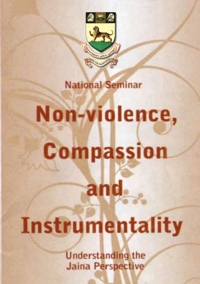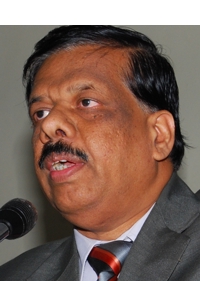Chennai 2009: Non-violence, Compassion and Instrumentality - A Jaina Perspective
 | Non-violence, Compassion and InstrumentalityA Jaina PerspectiveSeminar organized by the Department of Jainology of the University of Madras, 13 and 14 February 2009 Chennai, India |
Inaugural Address by the Vice-Chancellor Prof. Dr. S. Ramachandran
13.2.2009
Jainism as a religion exists in Tamil Nadu since more than 2000 years. During the 5th-6th century CE it was pervasive in many parts of this region. The architecture and Jain idols at many places like Gingee, Pudukottai, Kanchipuram, Sittannavasal, Aanaimalai, Alagarmalai, Ponnurmalai, bear evidence of the antiquity of Jainism in Tamil Nadu. The contribution of Jaina scholars to Tamil grammar and literature is well acknowledged. Silapathigaram, Jeevaka Sinthamani, Nannool, Naladiyar are some such authentic literary works authored by Jain scholars.
The Tirukkuṛaḷ has many chapters which reflect the Jain values. One such chapter praises the greatness of those who have renounced the world (Chapter 3 - Neethar Perumai), and some later chapters exemplify Forgiveness (Chapter 16), non-coveting (Chapter 18), Mercy, Avoidance of flesh-meat, (Chapters.25, 26 Ami, Pulal maruthal), abstaining from committing theft (Chapter.29), non-injuring, non killing, (Chapters.32, 33 Inma seyaamai, Kollarnai), Renunciation, Realization of truth, killing of desire (Chapters.35,
36.37) and Destiny (Chapter.38). All these are directly related to and are basic values in Jainism. With each chapter having ten couplets the coverage of these subjects is exhaustive.
Loving the neighbor is good, but loving all life is still greater. This is expressed by a well known poet of the Sangam period Kaniyan Poongunranar as “Yaadum Oore Yavarum Kelir” and the poet describes a Jaina view of how life is governed by destiny, in the line “Theedhum Nanrum Pirar thara vaara”.
This particular seminar is designed with a view to examine the subtle thoughts on “non-violence”, “Compassion” and connecting them with “instrumentality”.
Non-violence or being kind to all fellow beings is something which every religion preaches. But, the uniqueness of Jainism is that it is this fundamental value or basic “dharma” which leads to all other prescriptions. Non-violence in thoughts, words, attitudes and action is extended to all living beings. Damaging the nature is also considered as violence on nature. The question then is about the practice of non-violence in the day to day life.
Compassion is another important area to understand. It is not enough if you do not show violence: it is equally important that you practice compassion towards the less privileged, the helpless and those who cannot oppose or defend themselves. But there is rider imposed by the religious ethics. In showing compassion you should not claim yourself to be the master but be an instrument. As a Christian prayer goes “Lord, make me an instrument of Your peace; Where there is hatred let me sow love...”. In a some what similar sense, K-ahlil Gibran says about our children that “They come through us, but not from us and though they are with us, yet they belong not to us”. Working not as a master but as an instrument of God, with detachment, a sa service to the society and without hankering after the rewards is a parallel view seen in the Gītā.
In a Seminar like this, I hope you will be able to understand the depth and the subtle meanings of the theme of the Seminar and also think in terms of our practices in life so that we make our life as well as that of others slightly better.
By wishing all the participants and the organizers a meaningful and enjoyable Seminar, I am glad to inaugurate this Seminar.

 Prof. Dr. S. Ramachandram
Prof. Dr. S. Ramachandram